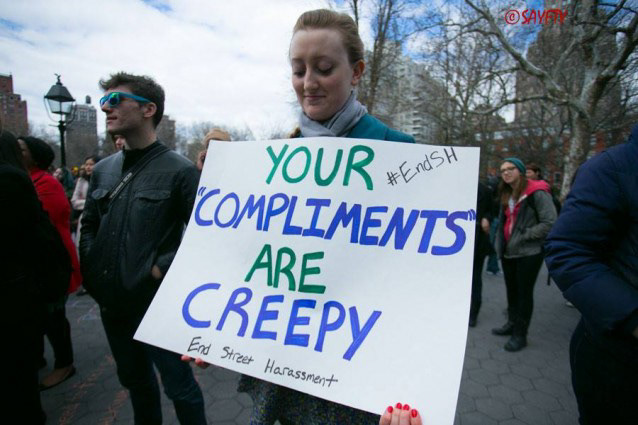
Photo courtesy of thinkprogress.org
September 25, 2014
My shoulders tense as a group of men smile and nod while they whisper and point at me from the parallel street. I stare at the red palm ahead, telling me it isn’t yet safe to walk. “Maybe I should have worn the slacks instead…Is this shirt too low-cut?” The light signals me to cross. I hurridly make my way across the asphalt, and the men must think it’s a performance. They whistle and clap and appraise me like an object. My cheeks flush red, but I manage to maintain my stoic expression. My disinterest makes them angry, and they respond with obscenities. Staring at the ground, I continue on.
This is a common scenario for women today. Research by the Hollaback! organization reports that 99% of women have been harassed on the street at some point in their lives. Unfortunately, the instances are rarely reported. In fact, most are unaware of how common street harassment is or what it can look like.
Harassment can include anything from whistling, honking, clapping, sexual gestures, to inappropriate comments or invitations. Common catcalls are ones like “Hey baby, give us a smile,” or “What’s up, sexy?” When ignored, though, the comments often becoming more threatening. “Do you think you’re too good for me (expletive)”, and “Where do you think you’re going?”
The consequences of this type of harassment are often unseen or down-played. These situations do more than degrade women or simply make them uncomfortable; they completely change how women feel about going out in public. Some fear it and limit their outings, especially if alone. Others have taken more extreme measures, purposely wearing baggier clothes and less makeup to look less desirable.
Street harassment is typically more common in big cities, but happens everywhere. Unfortunately, most places don’t have any law against it or even acknowledge it as an issue. Activists for ending the problem are making strides to change this, however. Street harassment as a global concern is a growing topic in the media, in the last month gaining attention from the Huffington Post, the Daily Show, the Yale Gazette, and NPR. Possibly making the biggest impression, though, is the billboards conveying messages like “Street harassment? Not cool. Women are not prey. Respect women, respect yourself,” and “Hey sexy is not a compliment. Unwanted comments are street harassment. Don’t just walk on. Hollaback!”
Jessica Williams summed it up best a week ago on the Daily Show: "[A woman's] walk to work is not there for him to comment on. It's not a red carpet, it's not a fashion week runway -- it's a sidewalk.”
This is a common scenario for women today. Research by the Hollaback! organization reports that 99% of women have been harassed on the street at some point in their lives. Unfortunately, the instances are rarely reported. In fact, most are unaware of how common street harassment is or what it can look like.
Harassment can include anything from whistling, honking, clapping, sexual gestures, to inappropriate comments or invitations. Common catcalls are ones like “Hey baby, give us a smile,” or “What’s up, sexy?” When ignored, though, the comments often becoming more threatening. “Do you think you’re too good for me (expletive)”, and “Where do you think you’re going?”
The consequences of this type of harassment are often unseen or down-played. These situations do more than degrade women or simply make them uncomfortable; they completely change how women feel about going out in public. Some fear it and limit their outings, especially if alone. Others have taken more extreme measures, purposely wearing baggier clothes and less makeup to look less desirable.
Street harassment is typically more common in big cities, but happens everywhere. Unfortunately, most places don’t have any law against it or even acknowledge it as an issue. Activists for ending the problem are making strides to change this, however. Street harassment as a global concern is a growing topic in the media, in the last month gaining attention from the Huffington Post, the Daily Show, the Yale Gazette, and NPR. Possibly making the biggest impression, though, is the billboards conveying messages like “Street harassment? Not cool. Women are not prey. Respect women, respect yourself,” and “Hey sexy is not a compliment. Unwanted comments are street harassment. Don’t just walk on. Hollaback!”
Jessica Williams summed it up best a week ago on the Daily Show: "[A woman's] walk to work is not there for him to comment on. It's not a red carpet, it's not a fashion week runway -- it's a sidewalk.”

